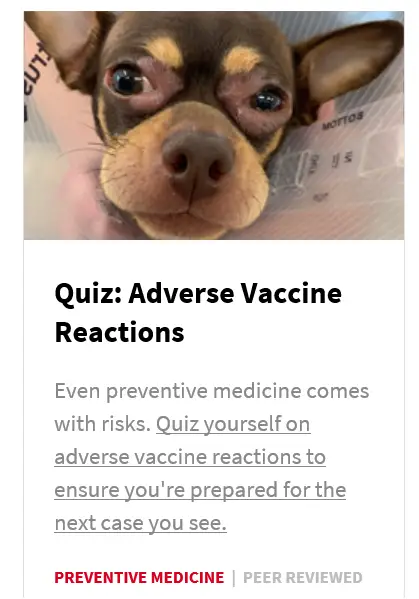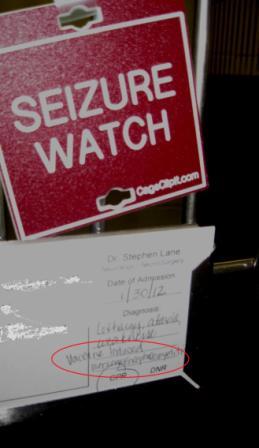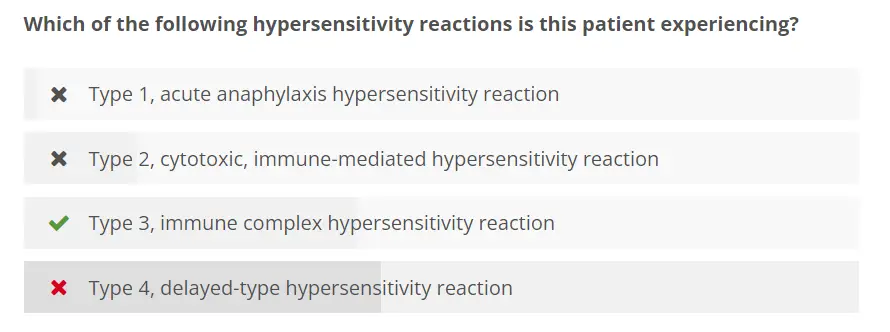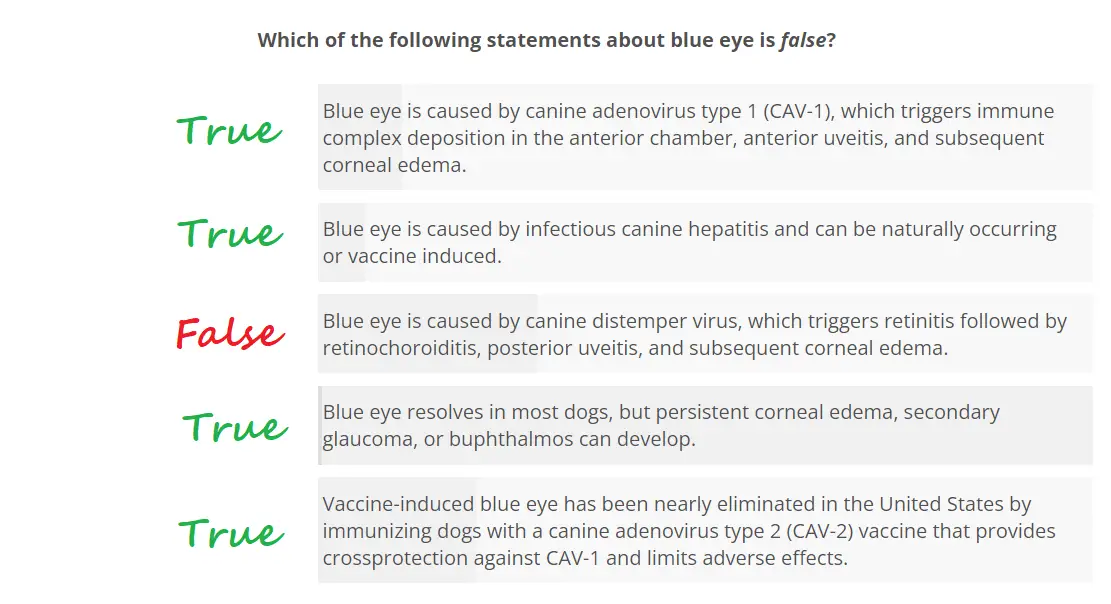For those new to Champion of My Heart's award-winning dog and veterinary content, let's recap that we gained some notoriety when Lilly, our original canine heroine, died from an adverse vaccine reaction to a routine rabies booster shot. That whole saga in painful detail here. Following that devastating experience, I pay particular attention to what shows up in the veterinary profession world about adverse vaccine reactions in dogs and cats. I recently found an online quiz about adverse vaccine reactions for veterinarians and staffers to take. Unfortunately, you need a login to see the whole thing. It's free to get a login. I have had one to this professional site for years, so I tried to take the quiz. I only got 2 of 9 answers right. The quiz includes some adverse vaccine reactions in dogs and cats I'd never even heard of. Sharing, as a friend says, for the good of the order. Let's learn a little something together.
More...
Adverse Vaccine Reactions in Dogs Rare?
Amid the consistent talking point about how rare adverse vaccine reactions in dogs are, I think the wording "to ensure you're prepared for the next case you see" is interesting. That makes it sound more common, but I tend to obsess about verbal nuance as a lifelong writer.
What happened to Lilly is indeed VERY rare. I chased down the data available years ago. But, the thing is this ... it does NOT feel rare when it happens to your dog. Trust me on that. Also, I did NOT say it was vaccine induced until the veterinary neurologist did, after doing all kinds of tests, including an MRI, to rule out other possible causes.
It has taken me the better part of a decade to recover from her death, including writing a pet loss book (that hit #1 on Amazon in its category when first published). I find having our most recent foster puppy die so suddenly recently nearly as difficult, especially since I'm still reeling and recovering from a dog attack in November 2021.
Adverse Vaccine Reactions in Dogs and Cats Quiz
So, how did I do on the quiz? Not so good since I'm writer with 25+ years writing about veterinary medicine but am NOT a DVM myself. I totally failed the quiz.
However, the topics of the questions remain interesting to me, including what's missing. Hint, hint.
Question 1
Question 1 details the case of the chihuahua in the photo above (who developed swelling due to fluid buildup around his eyes and muzzle within 30 minutes of vaccination). The question was about how to handle any future vaccines. Because we did something similar, including steroids, with Lilly's prior less-serious adverse vaccine reactions, I got that one correct.
Answer: Dogs with mild, but acute vaccine reactions often receive an antihistamine prior to any future vaccines. The fancy word is Diphenhydramine, but that's the same thing as Benadryl. In addition, adverse vaccine reactions in dogs like this typically need at least 2 weeks between individual vaccinations. In other words, you don't want to give them several vaccines at the same time. Even with my current dogs, I prefer they only get 1 vaccine at a time.
Question 2
Question 2 is a case of an indoor/outdoor kitty who develops what's suspected to be a feline injection-site sarcoma (FISS) between the shoulder blades (interscapular). That's a spot where veterinary teams often give vaccines. The quiz question asked for respondents to choose all that apply from a list of options of statements about feline injection-site sarcoma. I did not get this answer correct.
Answer: Basically current vaccine guidelines recommend giving cats vaccines in areas of the body that are MUCH easier for full surgical removal of any mass. Also, the following answer was correct: "A lump at an injection site that is present for ≥3 months, is >2 cm in diameter, or increases in size one month after vaccination should be surgically removed."
The explanation of the correct answers included this statement: "Despite extensive research, no definitive proof of FISS pathogenesis has been identified."
Question 3
Question 3 featured a case of a chihuahua mix dog who develops crusty and oozy sores on the ears and tail about 6 weeks after receiving 3 vaccines. The family brought the dog to the veterinary hospital 2 weeks after that, so 8 weeks after vaccination. The question was about why type of hypersensitivity reaction this patient experienced.
I got this wrong too. The multiple choice options were as follows:
- Type 1, acute anaphylaxis hypersensitivity reaction
- Type 2, cytotoxic, immune-mediated hypersensitivity reaction
- Type 3, immune complex hypersensitivity reaction
- Type 4, delayed-type hypersensitivity reaction
Answer: Apparently, this is a type 3 reaction called an "immune complex hypersensitivity reaction."
Question 4
Question 4 is a case of a 4-month-old miniature poodle puppy who developed a bald, somewhat scaly patch about 4 weeks after a rabies vaccination. The question was about the first line of treatment for adverse vaccine reactions in dogs like this. I had no idea, so I guessed wrong.
Answer: Apparently, the right answer is treatment with Pentoxifylline, which is an immune modulator med. The quiz went on to say that it can be done both with or without the addition of Vitamin E.
Question 5
Question 5 is about an 11-week-old Lab with these symptoms:
- Lack of energy
- Vomiting clear liquid
- Watery and bloody poops
Right before adoption, she got spayed and vaccinated, along with some other oral meds. The puppy's tests came back positive for both hookworm eggs and parvovirus. So the question was to choose all the correct statements from the list of options about the positive parvo test.
Answer: Having had 2 prior puppies survive parvovirus, I got this one right. Essentially 2 of the 4 possible answers were right.
- That the test should be considered a "true positive" of a natural parvo infection and NOT a false positive from the recent vaccination.
- That despite vaccination, the puppy should NOT be around other dogs because live parvo virus gets shed in her poops.
See additional posts to learn more about parvo in dogs:
Canine Parvovirus Explained – Outbreaks
Canine Parvovirus Explained – Window of Risk for Puppies
Canine Parvovirus Explained – Dogs Who Don’t Respond to the Vaccine
Question 6
Question 6 involved a case of a 6-month-old boxer puppy whose right eye turned blue about 3 weeks after receiving the most recent vaccines the owner ordered cheaply online (likely from outside the U.S. that likely included CAV-1) and administered at home to this puppy and several other animals in the household. The question wanted me to mark which of the list of statements is FALSE. I totally guessed and got it wrong.
Answer: Since the list of correct answers is more complicated, I'll include an image instead of trying to explain it myself. Those using a screen reader can access the text here. It's important to know that CAV-1causes infectious canine hepatitis, but today's vaccines do NOT include CAV-1 and instead provide cross protection via CAV-2.
Question 7
Question 7 gets a lot more complicated, but suffice it to say that it's a case of an adult cattle dog who had been diagnosed 5 weeks earlier for a UTI and needed antibiotics. She couldn't go back to doggy daycare until her kennel cough vaccine got boosted, so they did that too. Fast forward those 5 weeks, and she seemed tired and developed a honking cough. She (along with a few other dogs that attend the same daycare) tested positive for "canine infectious respiratory disease complex," basically kennel cough. The question is which of the answers "most likely explains [the diagnosis]." I got this one wrong too.
Answer: There is a chance this dog might have an autoimmune issue affecting the creation of antibodies from the vaccine. However, the most likely issue is that antibiotics given at the same time as the intranasal vaccine "inactivated the live bacteria in the vaccine, preventing an appropriate immune response."
Question 8
Question 8 is a tough case of a dog diagnosed with immune-mediated hemolytic anemia (IMHA), which is really scary and can be deadly even with the best possible treatments and interventions. The dog received DHPP and leptospirosis booster vaccines one month earlier and received ongoing treatment for some skin issues as well as regular use of preventive products for external parasites (fleas, ticks, etc.). If you want to learn more about IMHA, our friends at Fidose of Reality went through this with Dexter.
The quiz asked which statements were true about the possible connection between IMHA and vaccinations.
Answer: Basically, it's unclear if vaccination is involved in cases like this because IMHA is complicated and multifactorial. The quiz explanation text goes on to say that "overvaccination may play a role in immune-mediated diseases," but that one study said there was a connection to vaccines and other studies said there wasn't. The explanation section also says, "Although it is often advised to not vaccinate dogs that have had IMHA to avoid relapse, there is little evidence supporting this recommendation."
Question 9
Question 9 features an adult, mixed breed dog with a history of developing hives and wheals (like hives that come and go) after getting a rabies vaccine AND the combo vaccine for distemper, parvo, lepto, etc. So, the dog's family wanted to do titer tests instead of automatically vaccinating all the time. The quiz wanted people to choose all of the options that were TRUE about titer testing.
Answer: All of the options on the quiz were true and show how complicated the data on titer tests can be. What they mean, how they can be used, etc. It's also important to know that states DO NOT accept rabies titer tests (which are expensive) instead of legally required rabies vaccination.
Rather than hash all that out again, you can find details about titer testing in dogs here. Two things to know.
- The American Animal Hospital Association Vaccination Guidelines now feature information on titers. That's a pretty mainstream organization, so titers are NOT a fringe idea anymore like they were when I first asked about them in the 1990s.
- If my opinion and experiences matter to you, then I will say that I do indeed titer test my dogs and ONLY re-vaccinate them for things like distemper and parvo *if* my dogs tests are low. So far, after the full puppy series, only Tori has ever tested low and got boosted a couple years ago. I did go ahead and revax our eldest Clover this year with the combo vaccine just to be careful, but that's the first one she's had since she was a puppy. She is 8 this year.
I will also add that because Clover developed neutropenia (low white blood cells) that could have turned into an autoimmune issue we were able to get her a rabies waiver (here in CO), so she went 6 years between rabies vaccines. We figures since it had NOT turned into any real disease and since she continues to test low for neutrophils after many years then that must just be "normal" for her. We decided it was safe to go ahead and give her the rabies vaccine every 3 years for now, as required by law in Colorado, where we live.
Adverse Vaccine Reactions in Dogs - What's Missing From the Quiz?
Have you noticed yet what's missing from the quiz? It says NOTHING about cases like Lilly's, where she developed rabies vaccine-induced meningoencephalomyelitis. The oversimplified version is that it ruined her brain and spinal cord with inflammation, causing seizures and many other problems, including temporary blindness, inability to walk, incontinence, etc.
I once wrote a post called Adverse Vaccine Reaction: What I Didn’t Know, When I Didn’t Know It. Even with all my experience as a Dog Mom and longtime writer in the veterinary space, I did not know what happened to Lilly was possible. I knew about extreme allergic (and potentially deadly) reactions called anaphylaxis. It's the same as people with terrible allergies to bee stings or peanuts, for example. That's why they carry epipens.
Again, it is rare, but it's interesting to me that such types of reactions didn't make the quiz. Thanks to our devastating experience, though, now at least you know.
Interesting, Helpful?
Let me know if you found this interesting or helpful (or not).









Yes Roxanne, this was very interesting with me even though we lost Mercedes to long time side effects of over dose Rabies vaccine. We did not realize just what happened with her until the last illness took her life. Inadvertently she was given her first year rabies vaccine, then a second one two months later, in other word she was overdosed. The vet where she was treated wasn’t good about giving exit papers with info after each visit or perhaps I would have caught it early on? She required an emergency spay about that same time, our first two Lhasas sailed thru their spays, the vet attributed the gastro symptoms to the surgery where there was infection, also terrible diarrheah and vomiting that the vet said was caused by heavy doses of antibiotics. Then at 18 months she went blind in one eye, we took her to the best vet for that is this area, quite famous since he treated race horses. His diagnosis was a genetic problem even though her breeder had never had the problem as a top breeder. Since she gave us a health warranty when we purchased Mercedes we could have sent her back, didn’t even have to think about it, we loved her too much to let her go. Our state requires yearly rabies but they give a 3 year and having no idea what had happened her third vaccine was given with Benydryl since the vet said it was stronger. Overnight she became very ill, we almost lost her! The vet never said the vaccine caused the reaction so she was given two more 3 year vaccines, the final one she had a stroke and her neuro never recovered. No matter what we did, she refused to eat or drink water, she was in ICU for a week, by then she was moved to a larger animal care, three docs concurred the kindest thing was euthanasia. We had been thru that with several dogs and cats, all were elderly, Mercedes was 11 & 1/2 and most of her life she was sick. We found the mistakes when we agreed to turn over her records for study, finally had an answer but never dreamed it could have been avoided. Mostly I blamed myself for not being more proactive with her records and not seeing another specialist. My husband had a stroke just after her sudden blindness was found, I had to focus on running our business. Your book literally saved me and I finally came to terms with it all. Thank you form the bottom of my heart.
What a saga, Paula. I’m so sorry for everything you went through with Mercedes. Such a difficult path you’ve walked with your dogs and your hubs. Wishing you continued strength and peace.